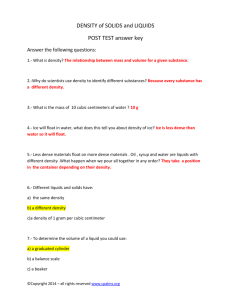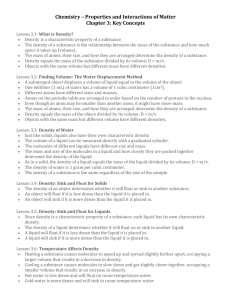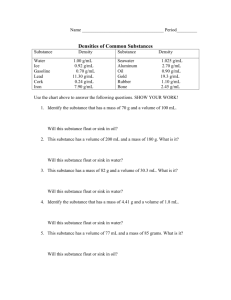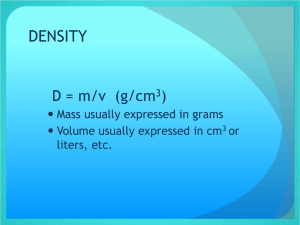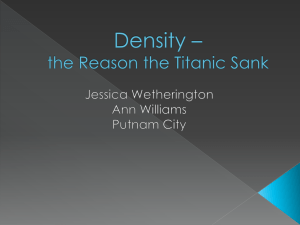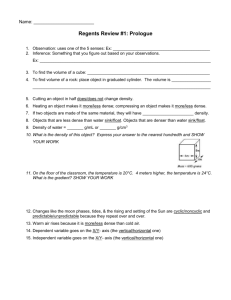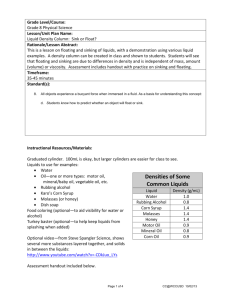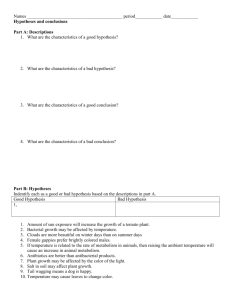Jeopardy
advertisement
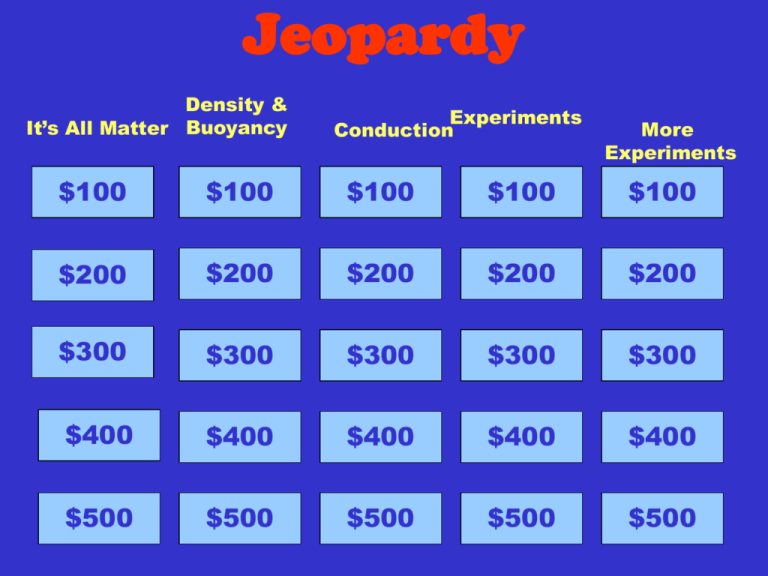
Jeopardy Density & It’s All Matter Buoyancy Experiments Conduction More Experiments $100 $100 $100 $100 $100 $200 $200 $200 $200 $200 $300 $300 $300 $300 $300 $400 $400 $400 $400 $400 $500 $500 $500 $500 $500 $100 What does indicate? solid liquid gas An increase in mass. Back $200 What needs to be added to cause an ice cube to change into steam? Heat Back $300 Water freezing into ice is an example of …? A liquid becoming a solid. Back $400 A student most likely using a glass of water and a lamp would be making a model of … evaporation Back $500 A student designs an investigation to find out if an ice cube melts faster in hot or cold water would need what tools? Thermometers, beakers, and timing device Back $100 Why does a duck float while a rock sinks in water? The rock has a greater density than the duck. Back $200 An ice cube floats in water because the … Solid state of water is less dense than the liquid state of water. Back $300 A teacher puts two tablets in a glass of water. The teacher stirs the water with a spoon until the tablets start to bubble. Which is less dense than the water? The bubbles Back $400 Students place four objects in water to see if they float. Their results are shown in the table. Item Floats in Water? Key No Eraser Yes Magnet No Cork yes The cork is less dense than the magnet. What is the BEST conclusion to draw from these results? Back $500 A student predicts that water will float on top of oil because oil looks thicker than water. After testing, this hypothesis will most likely be proven …? False, because water is denser than oil. Back $100 A student is melting a crayon for an art project. In order to be safe and prevent burns, the student chose a pot with a handle made of … Wood, because it is not a good conductor of heat. Back $200 A student blows up a balloon and ties it shut. Explain how it will look after being warmed over a light bulb for 10 minutes. It will expand all around. Back $300 A student filled four different bowls with 10 ice cubes in each. Each bowl was the same size and shape. The student timed how long it took all the ice cubes in each bowl to melt. Based on the data, what should the Cup What the Time to student conclude? bowl is melt made of (minutes) 1 Metal 10 2 Plastic 12 3 Clay 20 4 Glass 16 The metal bowl is the best conductor. Back $400 Material Magnetic? Conducts Transparent? tested electricity? Salt water No Yes Yes Paperclip Yes Yes No Nail Yes Yes No Bolt Yes Yes no You work with a lab partner to collect the data above. Your lab partner explains “Solids, liquids, and gases can conduct electricity.” Your data does not support your lab partner’s statement because … Gases were not tested. Back $500 What does this diagram show? A liquid. Back $100 Students watched a teacher make fudge. All the ingredients were combined in a saucepan over the stove. Then, the teacher poured the chocolate mixture into a pan. A few hours later, the teacher cut the fudge into squares that the students could pick up and eat. Why was the fudge no longer a liquid? The fudge became a solid as it cooled. Back $200 A pan of saltwater boils on the stove long enough so that only the salt remains. The water … Evaporated as water vapor. Back $300 The 4th graders at Hughes Elementary conducted an experimenting the effects of liquids on the melting rate of ice. What conclusion can you draw? Liquid Trial 1 time Trial 2 time Salt water 1:45 1:58 Lemonade 2:03 1:43 Kool-Aid 2:04 1:52 Soda 0:59 3:42 The results are unreliable; more trials are needed. Back $400 Students try to float a red plastic ball and a green plastic ball in three different liquids. List liquids from most dense to least dense. Ball Color Water Red Green Float Sink Cooking oil Sink Sink Glycerin, water, cooking oil Glycerin Float Float Back $500 Each popcorn kernel contains a small amount of water in a soft starchy center surrounded by a hull. The hull is tough and hard to break. What happens when popcorn kernels are heated above 100°C? The water turns to steam, creating pressure within the hull, which allows the starch to expand and explode. POP!!!! Back $100 A student applies a pat of butter to a piece of hot toast, the butter melts. The changes in the state of matter of the butter is … Solid liquid Back $200 Students formed three liquid layers in a glass. Then they dropped three different objects into the liquid. The students observed an item floating on each of the liquids. From this, students call tell which objects … Is the most dense Back $300 A sample of water and sediment is taken from a river. The sand and pebbles are allowed to settle for three hours. What explains why the pebbles are below the sand, which is below the water? Pebbles are more dense than sand or water. Back $400A student has four bars of soap. The student wants to test whether each bar will float in water. The student fills a sink with water. What is a good reason for placing all the bars of soap in the sink at once? Each bar of soap will be tested in the same water. Back $500 Why is orange juice a liquid and not a solid? It takes the shape of its container. Back
